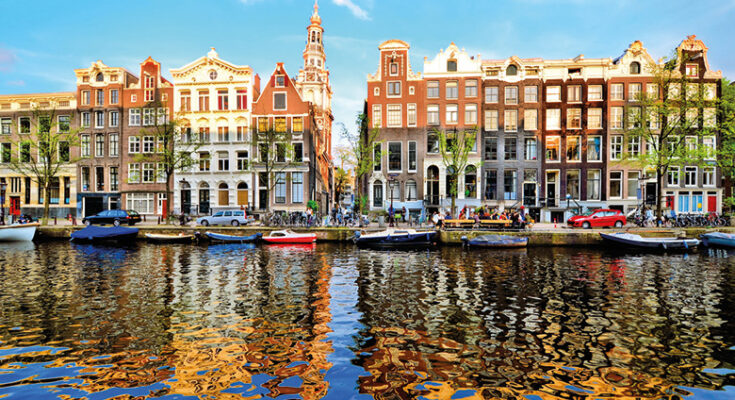Powerhouses of the Netherlands The Netherlands, a compact yet globally influential country, is home to some of the world’s most prestigious universities, blending academic excellence with vibrant cultural settings. From the bustling, cosmopolitan streets of Amsterdam to the historic, innovation-driven city of Delft, Dutch universities are shaping the future through cutting-edge research, diverse programs, and a commitment to global challenges. This article takes you on a journey through the academic powerhouses of the Netherlands, focusing on key institutions in Amsterdam, Delft, and beyond, while exploring their unique contributions, student life, and appeal for international students.
Amsterdam: The Cultural and Academic Heart
Amsterdam, the Netherlands’ capital, is a vibrant hub of culture, history, and innovation, making it a magnet for students worldwide. With its iconic canals, world-class museums, and multicultural atmosphere, Amsterdam offers an unparalleled backdrop for academic pursuits. The city hosts two standout institutions: the University of Amsterdam (UvA) and Vrije Universiteit Amsterdam (VU Amsterdam).
University of Amsterdam (UvA)
Founded in 1632, UvA is the largest university in the Netherlands, with approximately 32,000 students, including a significant international cohort from over 100 countries. Ranked among the top 60 globally by QS World University Rankings 2025, UvA excels in social sciences, humanities, AI, and data science. Its English-taught programs, such as the Bachelor’s in Political Science and Master’s in Artificial Intelligence, attract students seeking interdisciplinary and globally relevant education.
UvA’s innovation lies in its research centers, like the Amsterdam Institute for Advanced Metropolitan Solutions, which tackles urban challenges such as smart cities and sustainable planning. The university’s city-center campus fosters a dynamic student experience, with access to cultural landmarks like the Rijksmuseum and vibrant nightlife. UvA’s diversity initiatives ensure an inclusive environment, supported by organizations like the Erasmus Student Network (ESN), which hosts cultural exchanges and social events.
Vrije Universiteit Amsterdam (VU Amsterdam)
Established in 1880, VU Amsterdam is known for its research in sustainability, health sciences, and business. Ranked in the top 150 globally (Times Higher Education 2025), VU offers programs like the Master’s in Business Analytics and Bachelor’s in International Business Administration, appealing to students aiming for global careers. Its focus on societal impact is evident in research on climate change and global health, often in collaboration with NGOs and industry.
Located in Amsterdam’s Zuidas business district, VU’s campus blends academic rigor with a professional atmosphere. Students benefit from proximity to multinational companies, fostering internship and networking opportunities. VU’s commitment to diversity is reflected in its 20% international student population and programs promoting cross-cultural dialogue.
Student Life in Amsterdam
Amsterdam’s student life is as diverse as its population. Students cycle along canals, attend festivals like Amsterdam Dance Event, and explore cultural sites. Housing costs range from €500–€1,200 per month, with university residences (€400–€800) being competitive. The city’s international vibe, with 95% of residents speaking English (EF English Proficiency Index 2024), eases integration, while Dutch language courses offered by universities help students connect locally.
Delft: The Epicenter of Innovation
Just an hour from Amsterdam by train, Delft is a historic city known for its charming canals, blue-and-white pottery, and a global reputation for technological innovation. Home to Delft University of Technology (TU Delft), Delft is a cornerstone of the Netherlands’ academic and innovation landscape.
Delft University of Technology (TU Delft)
Founded in 1842, TU Delft is the Netherlands’ oldest and largest technical university, ranked among the top 10 globally for engineering and technology (QS 2025). With 25,000 students, including a significant international cohort, TU Delft is a leader in aerospace engineering, computer science, and sustainable energy. Its English-taught programs, such as the Bachelor’s in Aerospace Engineering and Master’s in Sustainable Energy Technology, attract students passionate about solving global challenges.
TU Delft’s innovation ecosystem is unmatched, with facilities like the Embedded Systems Innovation Lab and Robotics and Autonomous Systems Lab. The university collaborates with industry giants like Philips and Shell, and its TU/e Innovation Space supports student startups. Notable achievements include advancements in solar energy and the training of the Netherlands’ first astronaut, Wubbo Ockels. TU Delft’s focus on problem-based learning ensures students engage in hands-on projects, preparing them for tech-driven careers.
Student Life in Delft
Delft offers a more intimate, student-friendly atmosphere compared to Amsterdam. Its compact size and historic charm create a tight-knit community, with affordable housing (€400–€900/month) and a strong cycling culture. Students enjoy local cafés, the annual OWee orientation week, and proximity to The Hague and Rotterdam. TU Delft’s sports facilities and student associations, like the D.S.V. Sint Jansbrug, foster a vibrant social scene.
Beyond Amsterdam and Delft: Other Academic Powerhouses
While Amsterdam and Delft are academic giants, other Dutch cities host institutions that contribute significantly to the Netherlands’ reputation for excellence.
Utrecht University
Located in Utrecht, a 30-minute train ride from Amsterdam, Utrecht University is one of Europe’s oldest institutions, founded in 1636. Ranked in the top 70 globally (QS 2025), it excels in environmental sciences, medicine, and social sciences. Its English-taught programs, such as the Master’s in Sustainable Development, align with global priorities. Utrecht’s historic city center, with its canals and vibrant student life, offers a blend of tradition and modernity. Housing costs (€450–€1,000/month) are slightly lower than in Amsterdam, and the city’s central location makes it ideal for exploring Europe.
Leiden University
In Leiden, a 35-minute train ride from Amsterdam, Leiden University (founded 1575) is renowned for law, humanities, and biomedical sciences. Ranked in the top 100 globally, it offers programs like the Bachelor’s in International Relations and Organisations. Leiden’s historic charm, with landmarks like the Pieterskerk, and its proximity to The Hague’s international organizations, make it ideal for students interested in global affairs. Student life includes vibrant societies and affordable living (€400–€900/month).
Eindhoven University of Technology (TU/e)
In Eindhoven, known as the “Dutch Silicon Valley,” TU/e is a global leader in engineering and technology, ranked 13th worldwide (Times Higher Education 2024). Its programs in AI, data science, and nanotechnology, combined with partnerships with companies like ASML and Philips, drive innovation. Eindhoven’s modern vibe, lower living costs (€700–€1,000/month), and tech-focused environment attract students seeking careers in cutting-edge industries.

Why Study in the Netherlands?
The Netherlands’ academic powerhouses share several strengths that make them attractive to international students:
- English-Taught Programs: Over 2,100 programs in English ensure accessibility for global students.
- Innovative Education: Problem-based learning fosters critical thinking and collaboration.
- Global Rankings: Dutch universities consistently rank among the world’s best, ensuring high-quality education.
- Cultural Diversity: With students from over 200 nationalities, campuses are melting pots of ideas.
- Career Opportunities: Strong industry ties and a one-year post-graduation “orientation year” permit for non-EU/EEA students enhance employability.
Practical Considerations
- Tuition Fees: EU/EEA students pay ~€2,314/year; non-EU/EEA students pay €8,000–€20,000/year (2025 rates).
- Scholarships: Options include the Holland Scholarship (€5,000), Orange Tulip Scholarship, and university-specific grants.
- Visa Requirements: Non-EU/EEA students need a student visa and residence permit, sponsored by universities, requiring proof of funds (€12,000/year) and health insurance.
- Work Opportunities: Non-EU/EEA students can work 16 hours/week with a permit; EU/EEA students face no restrictions.
Challenges and Solutions
- Housing: Competitive in Amsterdam and Delft. Start searching early via university portals or platforms like Kamernet.
- Cost of Living: Budget €800–€1,200/month. Use student discounts and shared housing to save.
- Cultural Adjustment: The Dutch direct communication style may feel unfamiliar. Engage with student networks like ESN for support.
The Academic-Cultural Synergy
The journey from Amsterdam to Delft encapsulates the Netherlands’ unique blend of academic excellence and cultural richness. Amsterdam’s UvA and VU offer a cosmopolitan, multidisciplinary environment, while Delft’s TU Delft drives technological innovation. Beyond these cities, Utrecht, Leiden, and Eindhoven add depth to the Netherlands’ academic landscape, catering to diverse interests from sustainability to AI. Together, these institutions foster a global community where students collaborate on solutions to pressing challenges, supported by a welcoming, multicultural society. For international students, studying in the Netherlands is not just an education—it’s a gateway to a dynamic, future-focused experience.



